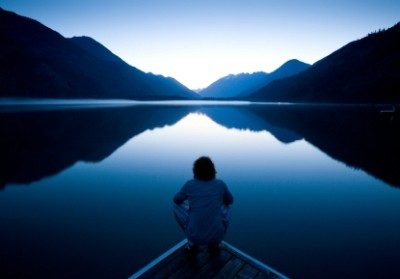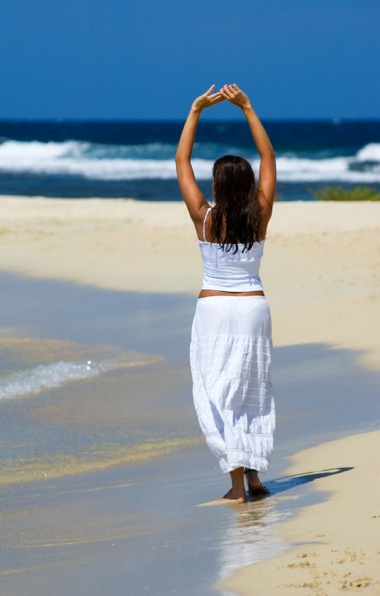Really Full Engagement in Life, Work, and Coaching

In 1971 Ram Dass (psychiatrist turned meditation teacher/guru) admonished us all to BE HERE NOW! (http://en.wikipedia.org/wiki/Be_Here_Now_(book), and the battle with the distraction capacity of our big brains has never let up. How many wonderful books, mindfulness practices, institutes, and even religions have arisen in our quest to focus on this very moment in front of us. Today a new and wonderful effort is underway with such great books as The Power of Full Engagement by Tony Schwartz (http://www.theenergyproject.com/blog/author/tony-schwartz) and Jim Loehr.
In this short video ( http://www.youtube.com/watch?v=ybfPNevrF00). Loehr nails “the real culprit”, not stress, but “insufficient volume of recovery”. He argues that we need to give people more permission to increase the frequency and intensity of their time spent in what he’s referring to as “recovery”. Balance. Yes, and if I may, “real balance”.
Think about it. When are you most vulnerable to distraction? When are you anxious, worried, impatient, and/or fearful and you are hurrying, making errors and omissions, “forgetting” things like deadlines and critical appointments? When are you checking e-mail 30 times a day, rushing here and there, texting while driving, missing what a client, an employee, a loved one, or even a train whistle is saying to you? No doubt it is when you are indeed out of balance. You’re not only experiencing stress (as usual) you are magnifying it’s effect on you mentally and therefore psycho-physiologically. Your stress hormones are running the show and you are pumping stomach acid, jamming up your muscle tension, blood pressure, heart rate and more.
Schwartz loves to talk about how we need to manage our energy, not time. Yet, like he and Loehr tell us, we’ve been denied the permission to truly do this. With Henry Ford assembly line mentality employers remain paranoid that the employee who is doing anything but nose-to-the-grindstone work is slacking off and cheating their boss. Culturally we’ve been admonished for centuries that “idle hands are evil hands”. Then along comes the efforts to bring balance into our lives through practices like meditation, Yoga, Tai Chi, biofeedback, etc., and such evidence-based practices are ridiculed as “touchy-feely” or “hippie-like”. With books like The Way We’re Working Isn’t Working (http://www.amazon.com/Way-Were-Working-Isnt-Performance/dp/1439127662) Schwartz is telling us to listen up, pay attention to the research and realize that burnout is a reality and working ungodly hours with no respite is the royal road to getting there, adding that to be truly competitive we have to be at our best and balance is the real key to that.
 Being present is about leaving distraction behind.
Being present is about leaving distraction behind.
Being in the present moment is indeed all about mindfulness. Today many are using the term mindfulness synonymously with meditation. Sorry, it’s not really the same thing. Meditation is a practice to increase mindfulness. Mindfulness, to me personally, and drawing upon my many years as a Gestalt therapist, is about Awareness. It is being fully engaged in the experience of the present moment. It is about noticing. It is about maintaining focus while not missing what is going on in the periphery. It is not about multitasking, it is about staying centered. It is continuing to compose on the computer while hearing the sounds of the van unloading outside my hotel window. It is really listening to a coaching client, not thinking ahead about what I am going to say to steer the conversation.
Full engagement also refers to a term that the humanistic psychologists of the personal growth Zeitgeist of the late 1960’s and into the 1970’s would use: full feeling reactivity. Being fully engaged means we are not numbing out our feelings either consciously (suppression) or subconsciously (repression). We are connected with our feelings and allowing ourselves to experience them more fully. We can still choose how we will respond to those feelings and how we will express ourselves about them (one aspect of real freedom). When we attempt to anesthetize ourselves to our feelings (to avoid feeling pain, for example) the problem is that there is no “local” anesthetic, only “general”. We find that while we might succeed in feeling less pain, we also pay the price of feeling less joy as well.
High Tech Blinders
Right now I’m in New Orleans preparing to present at a conference here. In The French Quarter it is common to see mules pulling buggies around the narrow streets earning their keep hauling tourists around town. The mules are admirable beasts, but part of their harness equipment includes blinders for their eyes to keep them facing forward and reducing their peripheral vision. I found myself noticing that many of the tourists were at times doing a type of “blinder” experience to themselves with their smartphones, cameras, etc. Instead of being fully engaged with the unique experience of this one-of-a-kind city, they at times were narrowing their own field of vision to a tiny screen or viewfinder. In the Jan./Feb. issue of National Geographic Traveler Magazine, Christopher Elliot shares a great little piece entitled “Savor the Trip, Don’t Tweet It!” (http://travel.nationalgeographic.com/travel/traveler-magazine/the-insider/tech-overload/). Our challenge is not having these high tech tools and toys around. They can have tremendous value. Our challenge, rather, is to not let them filter our experience and indeed cut us off from our experience.
Really being fully engaged is about embracing our experience, no matter what it is. It is about being up in our heads, down in our guts, and feeling through all our senses. We can increase our level of engagement by not fearing it, by practicing body awareness, sensory awareness and mindfulness methods. The benefits are there for our careers, our relationships, and simply, and perhaps most beautifully, for our very own joi de’ vivre.
Please add your thoughts through leaving a comment.








Only registered and logged in readers can leave comments.